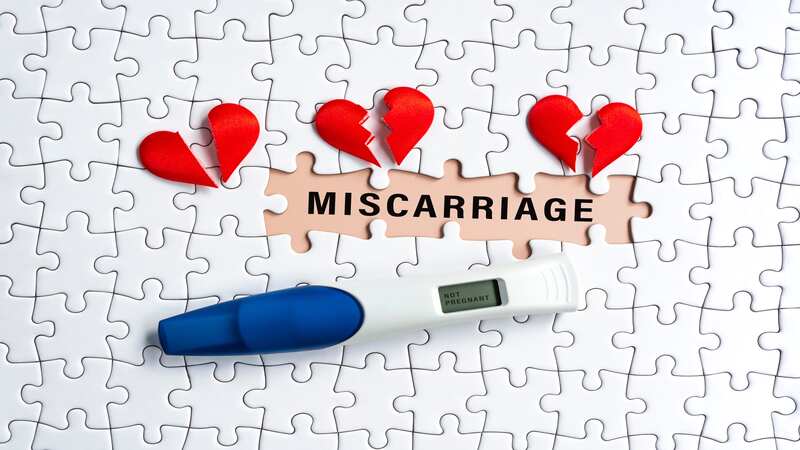
Miscarriage is the loss or termination of the pregnancy before 20 weeks of gestation. The miscarriage means to miscarry the products of conception. Around 10 to 15 % of all pregnancies end up in miscarriage, sometimes it remains unexplained (1).
In this article, we discuss in detail about first, second, and third-trimester losses and their causes. Threatened abortion is also being discussed along with its causes.
What Is A Miscarriage?
Miscarriage or abortion is the termination of pregnancy which can be spontaneous or induced before 20 20-week period of gestation or period of viability. Around 15% of all the conceptions land up in spontaneous miscarriage. About 70% are the first trimester losses (2).
A chemical pregnancy can be termed as early miscarriage, here the urine pregnancy test is positive but there is no sign of pregnancy in the ultrasound. This can also be due to chromosomal abnormalities (3).
Quick Facts About Miscarriages

Miscarriage means to miscarry the products of conception. It can depend on various Factors like infection, previous history, maternal medical conditions, etc. But every miscarriage is different from each other it depends on person to person.
Miscarriages can be of different types. They are as follows:
- Threatened miscarriage
- Inevitable abortion
- Spontaneous abortion
- Evitable abortion
- Induced abortion
- Chemical pregnancy
There are various risk factors for miscarriages (4) :
- Age – more than 35 years of age is a risk factor for miscarriage
- History of miscarriage
- Uterine or cervical problems
- Smoking, alcohol, caffeine intake
- Illegal drug consumption
- Genetic abnormalities
- Weight- obesity can also cause miscarriage
- Long-term medical conditions.
First Trimester Miscarriage And Its Causes

First trimester, i.e, miscarriage within the first 3 months of the pregnancy is more common than late trimester miscarriages. If a woman undergoes more than three times in her lifetime then the couple needs to be evaluated in detail for chromosomal or metabolic abnormalities (5).
Causes of First Trimester Miscarriage
If the woman is undergoing abortion time should not be wasted at home and she should be taken immediately to the hospital for immediate admission and treatment. If there is more bleeding, patients might need a surgical method of evacuation to stop the bleeding immediately (6). The causes are as follows –
- Chromosomal anomalies- around 50-60% of all the first trimester losses are due to chromosomal abnormalities. Autosomal trisomy, autosomal monosomy, triploidy, tetraploidy, Down syndrome, Edward syndrome, patau syndrome, abnormalities in deletion, translocation, and inversion (7).
- Immunological causes mainly APLA syndrome
- Endocrinological causes- luteal phase defect, insulin-dependent diabetes, thyroid abnormalities, PCOS.
- Genitourinary abnormalities
- Systemic infections- toxoplasma, herpes, chlamydia, mycoplasma, streptococcus, HIV, rubella, cytomegalovirus infection
- Unexplained causes
- Paternal factor- chromosomal translocation in the sperms.
Second Trimester Miscarriage And Its Causes

Second-trimester losses are mainly due to any weakness in the anatomical sites or any anatomical congenital malformations. However, during the second-trimester losses are not as common as first-trimester losses (8).
Causes of Second Trimester Miscarriage
- Anatomical causes- cervical insufficiency, congenital uterine malformations like didelphys uterus, bicornuate uterus, septate and sub septate uterus, Fisherman’s syndrome, submucous fibroid
- APLA syndrome
- Medical disorders like SLE , diabetes, renal disorders
- Maternal infections like toxoplasma, syphilis, HIV
- Unexplained factors
The treatment for cervical insufficiency is suturing the cervix by McDonald suturing, and bed rest following that. Mcdonald’s suturing can be done prophylactically if the patient has a history of previous second-trimester losses due to opening of the cervix prematurely (9).
Third Trimester Miscarriage And Its Causes

Generally third trimester losses are uncommon. If the woman has any systemic disorder it can lead to a decrease in placental blood flow which in turn leads to third-trimester loss. Close monitoring every 7 to 10 days is necessary with prompt treatment or delivery if needed. If proper treatment in the proper time is not done then it might lead to loss of the pregnancy (10).
Causes of Third Trimester Miscarriage
- Hypertensive disorder
- Placental abruption
- Uncontrolled Gestational diabetes mellitus
- Placenta previa
- Oligohydramnios
- Polyhydramnios
- Infection
- Premature rupture of membranes
- Chorioamnitis
- Preeclampsia
Causes Of Miscarriage In IVF Pregnancy

Abortions are a common complication in IVF pregnancy. IVF is done mainly in women who are more than 35 years of age, so the risk of abortion increases after 35 years of age since there are more chances of chromosomal abnormalities. Sometimes due to loss of endometrial receptivity, there are chances of miscarriage.
Again in IVF pregnancy, there are more chances of multiple pregnancies, which is against nature, so the pregnancies land up in abortion. So after IVF, the woman is asked to take bed rest at least until 3 months have passed so the incidence of abortion decreases. For multiple pregnancies conceived by IVF, the doctor generally prefers prophylactically tying the cervix at 14 to 16 weeks, so that second-trimester loss decreases due to cervical insufficiency (11).
Causes Of Threatened Miscarriage In Early Pregnancy

Threatened abortions are those where pregnancy is so far intact but there are obvious risks in continuation of it. The presenting symptoms are bleeding which can be followed by pain. The causes are-(12)
- Genetic factor- there are genetic abnormalities in the fetus
- Endocrine and metabolic factors in mother- PCOS, thyroid abnormality, uncontrolled diabetes, excess androgen
- Age- A maternal age of more than 35 years can lead to an abortion
- Infection- maternal infection during pregnancy like TORCH, bacterial infection, chlamydial infection etc
- Medical disorder- thrombophilias, hypertension, renal, cardiovascular disorder
- Environmental- alcohol, cigarette, drugs, irradiation
- Trauma
- Unexplained
Misconceptions About Miscarriage

The misconceptions that are present in society like the following things that cause abortion but these are just myths, not facts.
- Exercise including high-intensity workout
- Sexual intercourse
- Taking contraceptive pills
- Long hours of working
- Standing for a long time
After abortion, the woman should not blame herself for the abortion because it is not her fault. The family or society might blame the woman for abortion which might lead the woman to go into depression or any mental health problems. The family members and the husband should be gentle towards the female, who might go on a vacation so that the mind refreshes and does not have any problem conceiving in the future (13).
Can Stress Cause A Miscarriage?
There are studies conducted that show there is evidence that stress can cause miscarriage during pregnancy and can lead to abortion by an increase in unwanted hormones or toxins. So pregnant females are always advised to be happy and take less stress during the initial 3 months of the pregnancy.
As everything is described in detail in these articles, but if a woman is experiencing a miscarriage the family member should take the female immediately to the hospital. Miscarriage can lead to life-threatening consequences if the woman loses a lot of blood. The best advice about the miscarriage can be given by the obstetrician and the treatment should be taken without any undue delay. (14)
FAQ’s
1. How To Confirm A Miscarriage At Home
To confirm miscarriage at home, there will be bleeding per vagina with passage of clots and fleshy mass, and pain with cramps in the lower abdomen. If more bleeding then the patient can have dizziness, nausea, vomiting, and hypotension. The patient should immediately go to a nearby hospital so that an obstetrician can check and assess the condition of the pregnancy and the patient
2. How Do I Know If I’m Having A Miscarriage?
There will be signs like bleeding from vagina with passage of clots or fleshy mass. There can also be pain with cramps in the lower abdomen. These are the main signs where any lay mam can also understand if she is having abortion or not.
References
- Springe , New insights into mechanisms behind miscarriage – https://link.springer.com/article/10.1186/1741-7015-11-154
- M. Goddijn, N.J. Leschot, Genetic aspects of miscarriage, Best Practice & Research Clinical Obstetrics & Gynaecology – https://www.sciencedirect.com/science/article/abs/pii/S152169340090124X
- The Lancet , Recurrent miscarriage – https://www.thelancet.com/journals/lancet/article/PIIS0140-6736(06)69204-0/abstract
- Holland Andrew J, EMBO reports., Foijer Floris, Proceedings of the National Academy of Sciences – https://www.thieme-connect.de/products/ejournals/abstract/10.1055/s-0028-1087105
- Jurkovic D, Overton C, Bender-Atik R. Diagnosis and management of first trimester miscarriage BMJ 2013 – https://www.bmj.com/content/346/bmj.f3676.abstract#
- Department of Obstetrics and Gynecology, Recurrent Pregnancy Loss Program, Stanford University, Stanford, California – https://www.thieme-connect.de/products/ejournals/abstract/10.1055/s-0031-1293200
- Wiley Research DE&I Statement and Publishing Policies – https://obgyn.onlinelibrary.wiley.com/doi/abs/10.1111/j.1471-0528.2006.01193.x#:
- Michels TC, Tiu AY. Second trimester pregnancy loss. Am Fam Physician. 2007 Nov 1;76(9):1341-6. PMID: 18019878. – https://www.aafp.org/pubs/afp/issues/2007/1101/p1341.html#:
- Laura A. Linehan, Aoife G. Morris, Sarah Meaney, Keelin O’Donoghue, Subsequent pregnancy outcomes following second trimester miscarriage—A prospective cohort study, European Journal of Obstetrics & Gynecology and Reproductive Biology, Volume 237, 2019, Pages 198-203, ISSN 0301-2115 – https://www.sciencedirect.com/science/article/abs/pii/S0301211519301617#:
- Sneider, K., Langhoff-Roos, J., Sundtoft, I. B., & Christiansen, O. B. (2015). Validation of second trimester miscarriages and spontaneous deliveries. Clinical Epidemiology – https://www.tandfonline.com/doi/full/10.2147/CLEP.S85107#:
- Bellver, Joséa,b,c. BMI and miscarriage after IVF. Current Opinion in Obstetrics and Gynecology 34(3):p 114-121, June 2022. – https://journals.lww.com/coobgyn/abstract/2022/06000/bmi_and_miscarriage_after_ivf.4.aspx
- Joshua L Weiss, Fergal D Malone, John Vidaver, Robert H Ball, David A Nyberg, Christine H Comstock, Gary D Hankins, Richard L Berkowitz, Susan J Gross, Lorraine Dugoff, Ilan E Timor-Tritsch, Mary E D’Alton,
Threatened abortion: a risk factor for poor pregnancy outcome, a population-based screening study,
American Journal of Obstetrics and Gynecology,Volume 190, Issue 3,2004, Pages 745-750-ISSN 0002-9378 – https://www.sciencedirect.com/science/article/abs/pii/S0002937803011335# - Nada L. Stotland, Conceptions and misconceptions: Decisions about pregnancy, General HospitalPsychiatry, Volume 18, Issue 4,1996, Pages 238-243, ISSN 0163 8343 – https://www.sciencedirect.com/science/article/abs/pii/0163834396000436#
- Bardos, Jonah MD, MBE; Hercz, Daniel MSc; Friedenthal, Jenna MD; Missmer, Stacey A. ScD; Williams, Zev MD, PhD. A National Survey on Public Perceptions of Miscarriage. Obstetrics & Gynecology 125(6):p 1313-1320, June 2015-https://journals.lww.com/greenjournal/abstract/2015/06000/a_national_survey_on_public_perceptions_of.8.aspx#:
